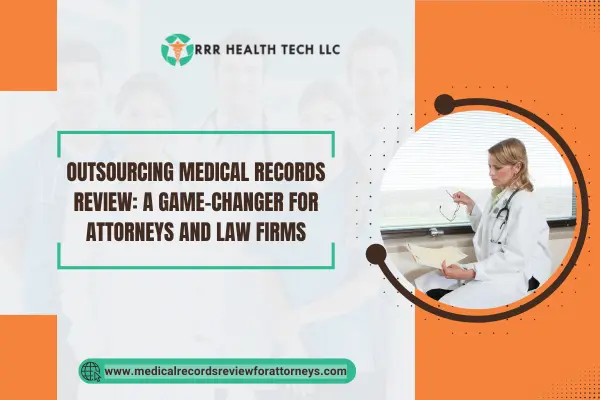
Every employee in the health care and insurance sectors facilitates the process of medical peer review that is accurate, quality, and integrity of content that settles claims. Peer review means examination of documentation or medical records and opinions of competent specialists in each area. This informal method aids in the expeditious processing of claims while enhancing the soundness of medical decisions in legal and insurance circumstances.
In this article, we will examine the goals and processes of medical peer reviews, their significance in insurance claim settlements, and their use by attorneys, medical providers, and insurers.
What is Medical Peer Review?
The medical peer review is a process undertaken by clinicians in which they evaluate their colleagues in the areas of medical practice, care delivery, and the outcomes of treatment. This review is essential to verify that the medical interventions done to the patients are correct, effective, and correspond to the best practices. There are peer reviews in a variety of medical areas including personal injury, malpractice, and health care insurance claims.
The Peer Review Process in Healthcare
Depending on the nature or type of the claim or case, the peer review process in healthcare has many steps and stages. Generally, the following sequences are observed:
- Submission of Medical Documentation: All relevant medical records and documentation are provided for the examination.
- Independent Evaluation by Medical Experts: Some medical practitioners or specialists in the relevant field closely examine the documented materials considering diagnosis, treatment, and its outcome.
- Analysis of Medical Facts: The peer reviewer then determines, if the care provided was commensurate with the accepted standard of medical practice and if there are gaps in the medical record, in how they might impact the claim.
- Detailed Report Preparation: The peer reviewer then writes an independent and fair report that states the findings, medical opinions, and recommendations.
- Submission to Claim Stakeholders: The peer review report is distributed among the concerned parties including the insurance companies, attorneys, and healthcare services providers for decision-making purposes.
Objectives of Medical Peer Review
Some of the reasons that medical peer review was done in the past were to know the relevance and accuracy of the medical assessments in insurance claims and legal cases. The main purposes of the process are detailed as follows:
1. Enhancing Accuracy of Medical Evaluations
The peer review process makes certain that medical evaluations of rehabilitation potential, disability status, diagnosis, and treatment are held according to the prevailing medical standards. This goal allows for the making of medical claims that are based on verified evidence and little chance of them being in error or fraudulent.
2. Improving the Speed of Claim Settlements
The medical peer review process puts a ‘new perspective’ on aspects of the medical records, and it reduces the time taken for the decision-making process. It has also been noted that the more accurate a claims review is, the timelier the processing and resolution of the associated insurance claim.
3. Ensuring Compliance with Medical Standards
The peer review process confirms that the interventions and procedures described in patient medical records appropriately meet the standard of care. This guarantees that the involved healthcare providers would be furnished with instructions that need to be followed and that the submitted claims are easily verifiable with the insurers.
4. Identifying Potential Malpractice or Fraud
Peer medical review consists of qualitatively evaluating discrepancies, illegitimate acts, or fraud concerning the medical records and guarantees that only genuine claims are processed. It also helps the insurance agency and the medical practitioner from the adverse effects of false claims.
5. Supporting Fair Compensation in Legal Cases
Implanting Medical Peer Review enables attorneys in personal injury, medical malpractice, and other legal suits to receive a fair amount of money in legal costs through impartial evidence and expert opinion. Legal medical reviewers check the viability of the medical evidence supporting the case and assist lawyers put in better.
How Does Medical Peer Review Facilitate Faster Claim Settlements?
Medical peer evaluation is pertinent to claim settlement, particularly in the insurance and litigation privacy spheres. The following explains how the process has a direct bearing on the timeline for resolving a claim:
1. Accurate Evaluation of Claims
The review by independent medical practitioners of the claim documentation leads to a concurrence that is not only broad-based, faster settlement, but also minimizes or eliminates the chances of obstinacy over medical facts. Accurate evaluation hastens the whole claims cycle.
2. Reduction of Back-and-Forth Between Parties
Medical peer reviews ensure that the communication problems caused due to insurance companies, healthcare providers, and legal teams do not arise. The expert review of the issues raised in the claim makes the information clearer and less clarification is needed.
3. Streamlining the Claims Resolution Process
The reports of peer review services for attorneys and insurance companies detail the medical issues that are critical to making sound decisions. This ensures that the resolution will be faster since evaluations of the physicians’ conclusions can guide the decisions.
4. Fewer Disputes Over Medical Evidence
The presence of a comprehensive peer-reviewed report minimizes disputes regarding a claim’s medical records as all parties to the claims can be assured of the claim’s objectivity and the competency of the reviewers of the claim. This results in a more efficient and effective claims process.
The Benefits of Medical Peer Review in Claim Settlements
Claim settlements against the parties are enhanced owing to the peer review process of all the parties involved in the claims process. The main benefits include:
1. Improved Quality of Medical Decisions
Peer review makes sure that the medical decisions are well substantiated and are free from bias. This ensures that the decisions made are reasonable to the claimants and the insurance companies as well.
2. Efficient Claims Handling
Insurers have been able to resolve claims faster and reduce backlogs with the help of medical peer overwatch services.
3. Increased Confidence in Claims Resolutions
Medical reviews for the claim make the insurance company and the legal team more confident regarding the claim as an independent expert has reviewed it.
4. Cost Savings
Faster resolutions of claims translate to savings among the insurers and the claimants. In addition, the review helps in weeding out the fraudulent claims thereby reducing the chances of losses to the insurance firm.
5. Objective and Impartial Reviews
Unbiased Reviews The quality of medical peer reviews offers challenges geared toward the claim in a professional and logical setting. Such neutrality is even more useful where medical malpractice or personal injury instances are involved.
Medical Peer Review in Different Types of Claims
Defining ‘Medical peer review’ it can be said that it is quite an important component in different types of claims ranging from personal injury to medical malpractice. Refer to the following instances of how peer review services assist cases in point:
1. Medical Peer Review for Personal Injury Claims
For personal injury claims specifically, medical peer review serves the purpose of clarifying whether the injuries noted are in line with the accident details provided and if the treatment rendered was necessary. This information is vital in determining the level of damages that should be deemed reasonable and consequently applying compensation on the same.
2. Medical Peer Review in Medical Malpractice Claims
Regarding malpractice cases, ‘Medical peer review’ enables and examines in detail Malpractice issues presenting whether indeed or not the patient’s healthcare provider possessed the right and requisite standards of care to assist the patient. This scrutiny will be able to pinpoint even the slightest of negligence giving a chance to the affected persons to get what is due to them.
3. Peer Review for Insurance Claims
For insurance purposes, peer review indicates medical evaluation conducted at some point by the insured provider to evaluate the information and extent of the injury for which treatment is being sought. This review process supports faster settlement as insurers trust the medical facts provided.
Expert Medical Record Review for Settlements
Legal and insurance claims include medical records review and services that assist in making certain that the medical components of a claim or defense are analyzed professionally. These services enable an independent and more in-depth medical records review with analysis of medical issues so that everyone concerned understands the medical facts. Expert reviews are especially needed in complicated cases where a review of medical evidence is necessary for a well-informed decision.
Conclusion
To sum up, the information presented during the medical peer review serves as an integral component during the resolution of the claim process in the healthcare, insurance, and legal industries. With independent parties reviewing medical records, medical review services allow for a faster settlement of claims and better medical judgment.
Be it personal injury, medical malpractice claims, or even healthcare insurance claims, one thing is evident about medical peer review—it aids in the provision of timely and precise information to attorneys, insurers, and healthcare providers so that informed decisions are made.
FAQs About Medical Peer Review
What is the role of medical peer review in claim settlements?
Medical peer review helps eliminate wrongful claims by making sure all medical facts found in the claim are industry and standard compliant.
This helps in speeding up the claims process by ensuring that there is an objective assessment placed on the claim which reduces disagreements that would have taken time to settle and so leads to faster conclusion of the claims process.
How does peer review support legal cases?
Legal cases are facilitated using peer review in the sense that lawyers are presented with unbiased and competent reviewers of medical records. This enables lawyers to make stronger cases and ensure that clients receive rightful reimbursement.


